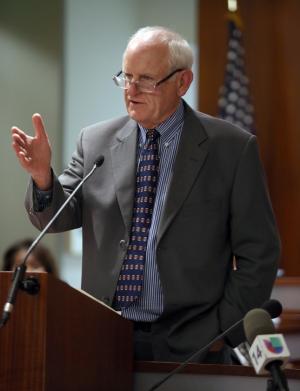See National Resource Network Richmond Budget Presentation April 26, 2016 for the budget presentation at the Richmond City Council on April 26, 2016. On May 2, 2016, City Manager Bill Lindsay will start to provide a pathway to reach a structurally balanced budget for FY 2016-17 that can become the foundation for structurally balanced budgets for the next five years.
If the City Council can come together on this, with help from our employee bargaining units, we can get it done, but it will take discipline and teamwork.
Richmond's budget deficit grows to $11 million
By Sarah Tan, stan@bayareanewsgroup.com
Posted: 04/27/2016 12:41:42 PM PDT
Updated: 04/27/2016 02:40:22 PM PDT
RICHMOND -- More difficult budget cuts could be on the way after city leaders learned this week that Richmond's shortfall heading into the next fiscal year has grown from $8.7 million to $11 million.
The city has a little over two months to approve next year's budget, and Richmond mayor Tom Butt said he was nervous.
" ... It is going to be hard, and we're going to have to be making trade-offs," he said at Tuesday's City Council meeting "It's very frustrating, and the time is short."

Richmond Mayor Tom Butt. (Jane Tyska/Bay Area News Group) (JANE TYSKA)
Most of the city's expenses are tied up in police and fire overtime and retiree benefits, according to consulting firm Public Financial Management, and rising workers' compensation insurance and other liabilities are pushing the deficit higher. The city has begun to address its shortfall by eliminating already vacant positions at City Hall and tapping a tax measure that had been promoted for road repair. However, City Manager Bill Lindsay says these measures will only save about $4 million.
"There's no question it's affecting us; probably you've seen the difference in staff already," he said.
Councilwoman Gayle McLaughlin said that although the report seemed ominous, she didn't think it was beyond fixing.
"I don't think the panic button should be pressed by any means, but I do think we need to seriously work through this," she said, citing proposed city taxes on medical marijuana as a way to close the gap.
Last month, the city also approved placing potential soda and real estate taxes on the ballot in November, which could generate about $7 million in additional revenue. However, if approved, the taxes would not go into effect in time for the 2016-17 fiscal year, which begins July 1.
Butt said the city may start to make more service cuts, particularly in an effort to reduce police overtime, which he said might mean fewer police community events and focusing more on "core police activities."
In addition to increased taxes, some council members also suggested raising fines for traffic violations as a way of bringing in more revenue, and some wondered if there could be ways of creating more "revenue-generating" opportunities for city departments. Russ Branson of Public Financial Management also warned that a potential ballot measure, the Richmond Kids First Initiative, could take about $4.5 million from the general fund by 2021 if approved by voters.
Overall, Butt said the growing budget shortfall may force the city to make some difficult cuts.
"We're getting to a place where we're between a rock and two hard places," Butt said. "I'm getting increasing complaints from constituents about services, people complain about tall grass in street medians, the homicide rate rising, there's not enough services for youth. Everybody's got a complaint, nobody's got a solution."
The report did provide a glimmer of hope, though. Branson said that if the city could overcome its budget shortfall for next year, it could see steady improvements in the next four years because of new tax measures and the sale of certain properties. The City Council is set to meet in May to review a draft of next year's budget and then adopt the budget at the end of June.
Sarah Tan covers Richmond. Contact her at 510-262-2789. Follow her at Twitter.com/sarahjtan. |

